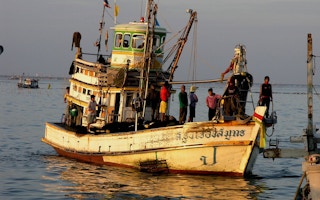Thailand’s fishing industry has made significant progress in curbing abuse, but measures to prevent rights violations must now be adopted in other sectors, and by Thai firms operating overseas, United Nations experts said on Wednesday.
The government must also allow activists to speak up without fear of retribution and better protect migrant workers, said the U.N. working group on business and human rights.
“We recognise that a lot has been done to stamp out abusive practices in the fishing industry, but the glass is half empty, and a lot remains to be done,” Dante Pesce told reporters at the end of a 10-day visit.
“The government and businesses must take similar actions to identify, prevent and remedy human rights violations in other sectors such as agriculture, energy, textiles, manufacturing and construction.”
The multibillion-dollar seafood sector, where many migrants work, has come under intense scrutiny in recent years following investigations that found slavery, trafficking and violence on fishing boats and in onshore processing facilities.
“
If Thai companies are investing outside and benefiting from these investments, then for any rights violations that occur there, there must be a remedy mechanism in Thailand.
Surya Deva, member, UN working group on business and human rights
The U.N. group, which made its first visit to the country on the invitation of the Thai government, met with officials, businesses and civil society organisations, Pesce said. It will submit a complete report next year.
Thailand has more than 3 million migrant workers, according to the International Organization for Migration.
Giving migrant workers the right to form unions, and allowing campaigners to speak up can empower them, said Surya Deva, another member of the U.N. group.
“A critical challenge will be to end recurring attacks, harassment and intimidation of human rights defenders, union leaders and community representatives,” he said.
The International Labour Organization last month reported continuing forced labour in the fishing industry, including abusive working conditions and excessive overtime, despite improvements.
The U.N. children’s agency (UNICEF) also said last week that women migrant construction workers and their children in Thailand are exposed to violence and abuse in hazardous living conditions.
Businesses must also apply best practices to their overseas operations to prevent abuse, Surya said.
“If Thai companies are investing outside and benefiting from these investments, then for any rights violations that occur there, there must be a remedy mechanism in Thailand,” he told the Thomson Reuters Foundation.
Last week, farmers in Cambodia filed a lawsuit in a Thai civil court against a Thai sugar producer, accusing it of rights abuses and of kicking them off their land. It is the first such lawsuit by plaintiffs from another country.
This story was published with permission from Thomson Reuters Foundation, the charitable arm of Thomson Reuters, that covers humanitarian news, women’s rights, trafficking, property rights, climate change and resilience. Visit http://news.trust.org)

















